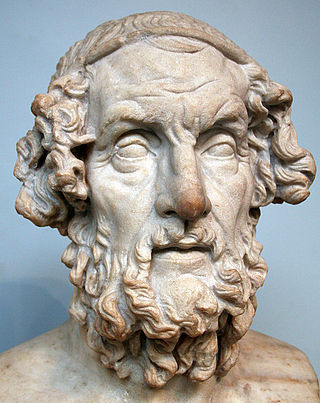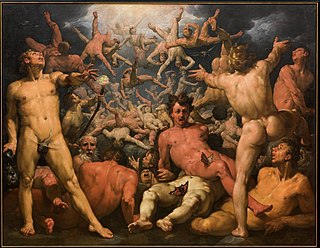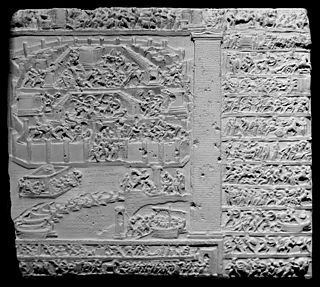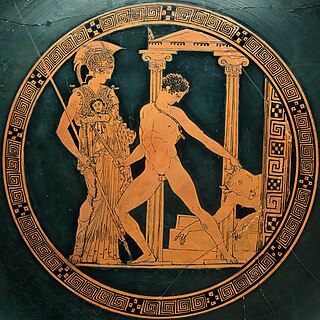Related Research Articles

Homer was an Ancient Greek poet who is credited as the author of the Iliad and the Odyssey, two epic poems that are foundational works of ancient Greek literature. Homer is considered one of the most revered and influential authors in history.

Hesiod was an ancient Greek poet generally thought to have been active between 750 and 650 BC, around the same time as Homer.
In Greek mythology, the Nereids or Nereides are sea nymphs, the 50 daughters of the 'Old Man of the Sea' Nereus and the Oceanid Doris, sisters to their brother Nerites. They often accompany Poseidon, the god of the sea, and can be friendly and helpful to sailors.

In Greek mythology, the Titans were the pre-Olympian gods. According to the Theogony of Hesiod, they were the twelve children of the primordial parents Uranus (Sky) and Gaia (Earth), with six male Titans—Oceanus, Coeus, Crius, Hyperion, Iapetus, and Cronus—and six female Titans, called the Titanides or Titanesses—Theia, Rhea, Themis, Mnemosyne, Phoebe, and Tethys.
In Greek mythology, Tethys was a Titan daughter of Uranus and Gaia, a sister and wife of the Titan Oceanus, and the mother of the river gods and the Oceanids. Although Tethys had no active role in Greek mythology and no established cults, she was depicted in mosaics decorating baths, pools, and triclinia in the Greek East, particularly in Antioch and its suburbs, either alone or with Oceanus.

The Homeric Hymns are a collection of thirty-three ancient Greek hymns and one epigram. The hymns praise deities of the Greek pantheon and retell mythological stories, often involving a deity's birth, their acceptance among the gods on Mount Olympus, or the establishment of their cult. In antiquity, the hymns were generally, though not universally, attributed to the poet Homer: modern scholarship has established that most date to the seventh and sixth centuries BCE, though some are more recent and the latest, the Hymn to Ares, may have been composed as late as the fifth century CE.

The Epic Cycle was a collection of Ancient Greek epic poems, composed in dactylic hexameter and related to the story of the Trojan War, including the Cypria, the Aethiopis, the so-called Little Iliad, the Iliupersis, the Nostoi, and the Telegony. Scholars sometimes include the two Homeric epics, the Iliad and the Odyssey, among the poems of the Epic Cycle, but the term is more often used to specify the non-Homeric poems as distinct from the Homeric ones.

Ancient Greek literature is literature written in the Ancient Greek language from the earliest texts until the time of the Byzantine Empire. The earliest surviving works of ancient Greek literature, dating back to the early Archaic period, are the two epic poems the Iliad and the Odyssey, set in an idealized archaic past today identified as having some relation to the Mycenaean era. These two epics, along with the Homeric Hymns and the two poems of Hesiod, the Theogony and Works and Days, constituted the major foundations of the Greek literary tradition that would continue into the Classical, Hellenistic, and Roman periods.
In Greek mythology, Dynamene was a Nereid or sea-nymph, one of the 50 daughters of the "Old Man of the Sea" Nereus and the Oceanid Doris. Her name, a participle, means "she who can, the capable one." She, along with her sister Pherusa, was associated with the might and power of great ocean swells. Dynamene had the ability to appear and disappear rapidly. Some variations of her name were Dyomene and Dinamene

A rhapsode or, in modern usage, rhapsodist, refers to a classical Greek professional performer of epic poetry in the fifth and fourth centuries BC. Rhapsodes notably performed the epics of Homer but also the wisdom and catalogue poetry of Hesiod and the satires of Archilochus and others. Plato's dialogue Ion, in which Socrates confronts a star player rhapsode, remains the most coherent source of information on these artists. Often, rhapsodes are depicted in Greek art, wearing their signature cloak and carrying a staff. This equipment is also characteristic of travellers in general, implying that rhapsodes were itinerant performers, moving from town to town. Rhapsodes originated in Ionia, which has been sometimes regarded as Homer's birthplace, and were also known as Homeridai, disciples of Homer, or "singers of stitched lays."

The Aithiopis, also spelled Aethiopis, is a lost epic of ancient Greek literature. It was one of the Epic Cycle, which told the entire history of the Trojan War in epic verse. The story of the Aethiopis lands chronologically after the Homeric Iliad, and could be followed by that of the Little Iliad. The Aethiopis was often attributed by ancient writers to Arctinus of Miletus who lived in the 8th century BC. The poem comprised five books of verse in dactylic hexameter. Very few fragments of the Aethiopis survive today; Proclus's summary of the poems' contents establishes the narrative framework of the epic.

Stesichorus was a Greek lyric poet native of Metauros. He is best known for telling epic stories in lyric metres, and for some ancient traditions about his life, such as his opposition to the tyrant Phalaris, and the blindness he is said to have incurred and cured by composing verses first insulting and then flattering to Helen of Troy.
Homeric Greek is the form of the Greek language that was used in the Iliad, Odyssey, and Homeric Hymns. It is a literary dialect of Ancient Greek consisting mainly of an archaic form of Ionic, with some Aeolic forms, a few from Arcadocypriot, and a written form influenced by Attic. It was later named Epic Greek because it was used as the language of epic poetry, typically in dactylic hexameter, by poets such as Hesiod and Theognis of Megara. Compositions in Epic Greek may date from as late as the 5th century CE, and it only fell out of use by the end of classical antiquity.

The Homeric Question concerns the doubts and consequent debate over the identity of Homer, the authorship of the Iliad and Odyssey, and their historicity. The subject has its roots in classical antiquity and the scholarship of the Hellenistic period, but has flourished among Homeric scholars of the 19th, 20th, and 21st centuries.

Martin Litchfield West, was a British philologist and classical scholar. In recognition of his contribution to scholarship, he was appointed to the Order of Merit in 2014.

The Greek word aoidos referred to a classical Greek singer. In modern Homeric scholarship aoidos is used by some as the technical term for a skilled oral epic poet in the tradition to which the Iliad and Odyssey are believed to belong.
The Contest of Homer and Hesiod is a Greek narrative that expands a remark made in Hesiod's Works and Days to construct an imagined poetical agon between Homer and Hesiod. In Works and Days, Hesiod claims he won a poetry contest, receiving as the prize a tripod, which he dedicated to the Muses of Mount Helicon. A tripod, believed to be Hesiod's dedication-offering, was still being shown to tourists visiting Mount Helicon and its sacred grove of the Muses in Pausanias' day, but has since vanished.

Greek mythology is the body of myths originally told by the ancient Greeks, and a genre of ancient Greek folklore, today absorbed alongside Roman mythology into the broader designation of classical mythology. These stories concern the ancient Greek religion's view of the origin and nature of the world; the lives and activities of deities, heroes, and mythological creatures; and the origins and significance of the ancient Greeks' cult and ritual practices. Modern scholars study the myths to shed light on the religious and political institutions of ancient Greece, and to better understand the nature of myth-making itself.
Classical reception studies is the study of how the classical world, especially Ancient Greek literature and Latin literature, have been received since antiquity. It is the study of the portrayal and representation of the ancient world from ancient to modern times. The nature of reception studies is highly interdisciplinary, including literature, art, music, film, and games. The field of study has, within the past few decades, become an increasingly popular and legitimized topic of interest in Classical studies.
In Greek mythology, Amphithoë was the Nereid of sea currents and thus a daughter of the 'Old Man of the Sea' Nereus and the Oceanid Doris. She was probably the same as Amphitrite.
References
- 1 2 "Prof. B Graziosi". Durham University. Retrieved 26 July 2017.
- ↑ "Who We Are – Living Poets". Durham University. Retrieved 26 July 2017.
- 1 2 3 4 5 Graziosi, Barbara. "Barbara Graziosi – Biography". Durham University. Archived from the original on 24 August 2017. Retrieved 27 July 2017.
- ↑ Graziosi, Barbara (1999). Inventing the poet: a study of the early reception of the Homeric poems. E-Thesis Online Service (Ph.D). The British Library. Retrieved 7 March 2018.